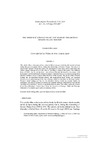Please use this identifier to cite or link to this item:
https://accedacris.ulpgc.es/jspui/handle/10553/41373
| DC Field | Value | Language |
|---|---|---|
| dc.contributor.author | Mulligan, Maureen | - |
| dc.date.accessioned | 2018-06-26T10:40:01Z | - |
| dc.date.available | 2018-06-26T10:40:01Z | - |
| dc.date.issued | 2016 | - |
| dc.identifier.issn | 0081-6272 | - |
| dc.identifier.uri | https://accedacris.ulpgc.es/handle/10553/41373 | - |
| dc.description.abstract | This article offers a discussion of two books by British women which describe travels in Spain during the post-war period, that is, during the dictatorship of General Franco. The aim is to analyse how Spanish culture and society are represented in these texts, and to what extent the authors engage with questions of the ethics of travelling to Spain in this period. Two different forms of travel - by car, and by horse - also influence the way the travellers can connect with local people; and the individual's interest in Spain as a historical site, or as a timeless escape from industrial northern Europe, similarly affect the focus of the accounts. The global politics of travel writing, and the distinction between colonial and cosmopolitan travel writers, are important elements in our understanding of the way a foreign culture is articulated for the home market. Women's travel writing also has its own discursive history which we consider briefly. In conclusion, texts involve common discursive and linguistic strategies which have to negotiate the specificity of an individual's travels in a particular time and place. The authors and books referred to are Rose Macaulay's Fabled Shore: From the Pyrenees to Portugal (1949) and Penelope Chetwode's Two Middle-Aged Ladies in Andalusia (1963). | - |
| dc.language | eng | - |
| dc.publisher | 0081-6272 | - |
| dc.relation.ispartof | Studia Anglica Posnaniensia | - |
| dc.source | Studia Anglica Posnaniensia [ISSN 0081-6272], v. 51 (4), p. 5-27 | - |
| dc.subject | 6202 Teoría, análisis y crítica literarias | - |
| dc.subject | 57 Lingüística | - |
| dc.subject.other | Ethics | - |
| dc.subject.other | Post war Spain | - |
| dc.subject.other | Tourism | - |
| dc.subject.other | Travel writing | - |
| dc.subject.other | Women travellers | - |
| dc.title | The representation of Francoist Spain by two ritish women travel writers | - |
| dc.type | info:eu-repo/semantics/Article | - |
| dc.type | Article | - |
| dc.identifier.doi | 10.1515/stap-2016-0017 | |
| dc.identifier.scopus | 85014075890 | - |
| dc.contributor.authorscopusid | 56800081200 | - |
| dc.description.lastpage | 27 | - |
| dc.identifier.issue | 4 | - |
| dc.description.firstpage | 5 | - |
| dc.relation.volume | 51 | - |
| dc.investigacion | Artes y Humanidades | - |
| dc.type2 | Artículo | - |
| dc.date.coverdate | Diciembre 2016 | |
| dc.identifier.ulpgc | Sí | es |
| dc.description.sjr | 0,115 | |
| dc.description.sjrq | Q2 | |
| dc.description.erihplus | ERIH PLUS | |
| item.fulltext | Con texto completo | - |
| item.grantfulltext | open | - |
| crisitem.author.dept | GIR Estudios sociolingüísticos y socioculturales | - |
| crisitem.author.dept | Departamento de Filología Moderna, Traducción e Interpretación | - |
| crisitem.author.orcid | 0000-0002-5503-6751 | - |
| crisitem.author.parentorg | Departamento de Filología Moderna, Traducción e Interpretación | - |
| crisitem.author.fullName | Mulligan, Maureen | - |
| Appears in Collections: | Artículos | |
Page view(s)
44
checked on Jan 11, 2026
Download(s)
56
checked on Jan 11, 2026
Google ScholarTM
Check
Altmetric
Share
Export metadata
Items in accedaCRIS are protected by copyright, with all rights reserved, unless otherwise indicated.
